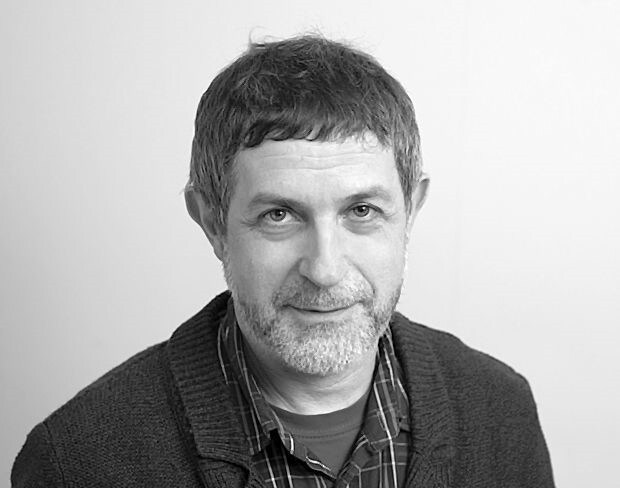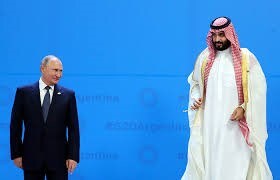Sergey Shelin, the "observer" (featured writer) for the popular online news portal Rosbalt, believes that the debate over whether Russia's rejoining the OPEC production-cut agreement in April 2020, after having abandoned it a month previously, constitutes an economic defeat for Russia is a mistaken one. The coronavirus is responsible for the collapse of oil prices. The main takeaway from the new agreement is that Vladimir Putin, for the first time since he came to power twenty years ago, sustained a political defeat. Having taken the measure of the Europeans, George W. Bush, Barack Obama and others, Putin was compelled to behave deferentially to Saudi Crown Prince Muhammad bin Salman.
Russia will somehow get through the economic difficulties, believes Shelin. It remains to be seen how the political setback will affect the ambitions of Russia's leadership.
Shelin's article follows below:[1]

Sergey Shelin (Source: Rosbalt.ru)
It Is Not The Economy Stupid
"Leonid Fedun (LUKOIL) calls [the oil deal] the “Brest Peace”, i.e. a humiliating truce. Alexander Dyukov (“Gazpromneft”) does not agree with him: the oil deal is indispensable for all participants, and 'there is nothing humiliating about it.'
"But the oil “heavyweight” Igor Sechin silently sorted things out. More precisely, the new chief editor of the “Vedomosti” newspaper did everything for him. Despite the protests of his team, he simply removed [from newspaper’s website] an article about Sechin written by economist Konstantin Sonin. The article stated that the “Sechin era” in the Rosneft leadership would be remembered “not by the incompetence and losses of the first years, but by March 2020,” i.e. by a lost price war with the Saudis.
"A blind man could see, that Sechin did not ask to remove this text. And Sonin in his material rejects the popular thesis 'Sechin torpedoed the oil price', quite rightly indicating that the oil price collapsed due to a fall in global demand. But for our top oilman, apparently, any discussion of this distressing topic is intolerable. I believe that in his heart he shares Sonin’s main thesis: 'It’s not about who is to blame, it's about who is remembered in difficult circumstances as the main culprit.' All our bosses are fundamentally against being perceived as culprits of any sort. Vladimir Putin (without whose go-ahead Sechin’s price war with Saudi Arabia would have been impossible) is also against this. Incidentally, it is no coincidence that he is silent about the new OPEC + deal.
"In early April, Putin informed subordinates that it would be necessary to end the price war and to limit oil production. At the same time the country’s leader thrice named the Saudis to be the initiators of the OPEC + deal breaking. In response the 'oil kingdom' [Saudi Arabia] immediately froze negotiations for several days and made comments about our head of state. (Up to this moment Putin didn’t allow anyone to make such comments).
Putin, Who Bested Bush Jr., Obama, Sarkozy And Others Must Grovel Before Bin Salman
"However, this time he had to keep silent, and even enter into personal negotiations not only with the king, but also with Crown Prince Muhammad bin Salman, (a self-confident and impudent man who is young enough to be Putin’s grandchild).

In a photo taken at the G20 meeting bin Salman towers over Putin (Source: Interfax.ru)
"Such cringing in foreign policy has never occurred in all of Putin's 20 years. At the beginning of the 2000s, Bush Jr. looked trustingly into the eyes of the young leader. In 2008, French President Sarkozy grovelingly asked Putin to stop Russian troops at the outskirts of Tbilisi. In 2013, long before the start of the military operation in Syria, the Russian leader overshadowed the confused Obama and assumed the role of arbiter in the Syrian strife. In the beginning of 2015, the European rulers begged Putin to stop the war in the Donbass (and narrowly achieved that task). And at the end of the same year, after the Su-24 was shot down, Putin 'trampled' the Turkish leader in absentia. True, Erdogan turned out to be a tough guy, but even now, in the public communication between the two leaders, one can observe a semblance of equality.
"Nothing similar occurred now. The price war conducted early March had to be stopped in its tracks. And [our leadership] had to restrain itself from self-praise and blaming others for the sake of a new OPEC+ agreement. The former 'energy superpower' agreed to become a member of OPEC, an organization which is in fact is led by the United States and Saudi Arabia, on a par with the dozens of oil-trading countries.
"In an economic sense, the deal announced on April 12 is not at all a defeat for Russia. But in the political sense, it’s a surrender of a magnitude, which our regime had never endured in the 21st century.
"Oil prices dropped not because of the March price war, but because the coronavirus epidemic in a couple of months collapsed global fuel demand by 20 million barrels per diem (20%). This is a historical record. The logical answer of the oil-trading states now is a radical collective reduction in oil production (or at least a solemn declaration on such reduction).
Putin And Sechin Were Conceited Enough To Think They Could Control Oil Prices
"There were no united actions of such magnitude in the history of mankind. Even the famous Arab oil boycott of 1973 involved far fewer exporting countries. Therefore, the new OPEC + deal of the night before had a longer way to go. I confess self-critically that I was mistaken in the timing: I thought we had a couple months more before the conclusion of new deal. The fact that our leaders admitted defeat in the trade war only four weeks after they started it, does not correspond to their ambitions.
"But it was completely logical for them to unleash the [oil price] war. Our leaders rushed into battle when they saw the drop in oil prices and heard the Saudi’s cautious demand to cut production by just 1.5 million barrels (and not by 10-15 million barrels, according to the new deal). Because they are used to standing up to and winning in any external challenges.
"Of course, the probability of success was almost nil from the very beginning. Our 'chiefs' lost their knack, and their sycophant experts, have long requalified as clowns. The oil market sank with unforeseen rapidity, completely disobeying the instructions and expectations of Vladimir Vladimirovich [Putin] and Igor Ivanovich [Sechin]. But they tried to hold on as if they could control it. A popular myth that they torpedoed the oil price became an echo of their ego."

Vladimir Putin with Igor Sechin (Source: Rbc.ru)
"But if we view the proceeding on a purely economic plane, then with the country’s existing huge reserves, they could hold out at least until the summer and surrender only after a fierce struggle. Apparently, they rushed [with the admission of defeat] due to issues of a political order (for example the prospect that by imposing sanctions on Rosneft, Russian oil exports could be blocked).
"I repeat: a political and not an economic defeat of our regime took place. In economic terms, the OPEC + deal is merely an attempt by the oil-exporting states to make their losses predictable and distribute them in proportion to the counties’ contribution to the oil trade.
"How much the deal will bring to the participants and whether it will be respected at all is a separate issue. But in any case, it is not the oil deal that inflicts a crushing blow to the Russian treasury, but the decrease of global fuel demand caused by the epidemic.
"But the ambitions of the Russian leadership suffered a devastating blow. Under the pressure of events, for almost the first time, our leaders had to act differently from what their instincts about life told them.
"As for Russia itself, the country is entering in zigzags an era of decreasing oil profits. [It will be] hard, but manageable."
[1] Rosbalt.ru, April 14, 2020.








